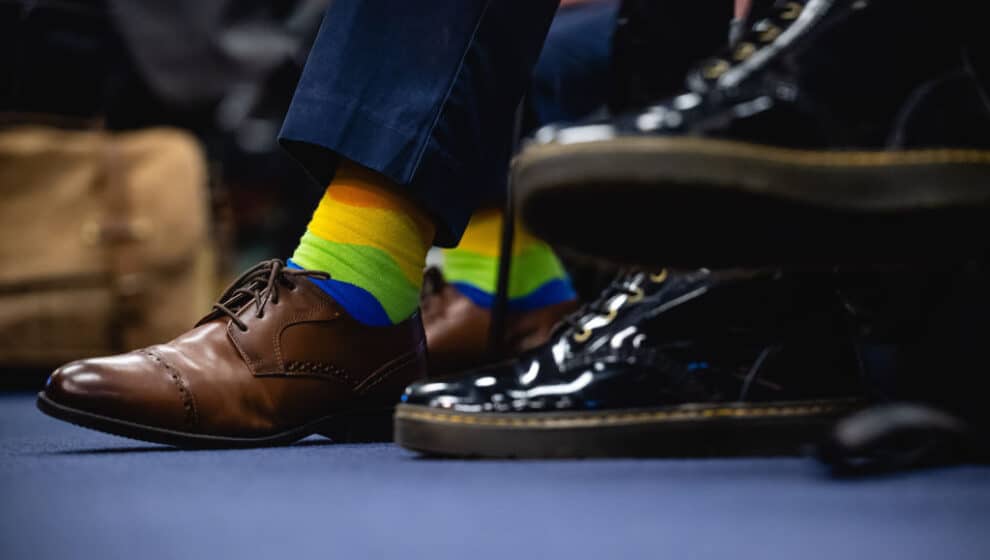Diversity, equity, and inclusion (DEI) issues have become a hot topic for modern business and politics—but the approach people take to them on both sides of the political aisle can vary.
Key Details
- Republican leaders like Texas Governor Greg Abbot and Florida Governor Ron DeSantis have made news with their efforts to ban DEI on college campuses and in business environments.
- On March 13, DeSantis held a roundtable discussion to “expose” the effects of DEI in higher education, to which Axios Tampa journalist Ben Montgomery directly emailed the governor’s office that “this is propaganda.” He was subsequently fired.
- Houston’s Rice University is currently defending in court its right to implement diversity programs against a February order from Governor Abbot to stop considering diversity in hiring.
- Politico has dismissed the DEI backlash as the “new Red Scare for red states.”
- Corporations have begun backsliding in commitments to DEI, as hiring for women and ethnic minorities has slowed down, Fortune alleges.
Why It’s Important
DEI has become a leading issue in the business world over the past three years. Businesses invested in bringing greater diversity to companies through hiring initiatives, internal restructuring, policy changes, and seminars with DEI and anti-racism experts.
The issue has also become a significant political football, with prominent Republicans aiming at the practice in a larger push against Democratic advocacy for underrepresented minority groups and communities. Florida Governor Ron DeSantis is currently taking the lead on the issue, advocating banning DEI in state colleges.
Francisco Gonzalez is an entrepreneur who studies constitutional law, is a first-generation Mexican immigrant, and self-describes as a gay Catholic. He is a public advocate for inclusion, but he has complicated views about how DEI initiatives are being expressed in the corporate world and advocated by political parties.
Gonzalez tells Leaders Media that true inclusion creates spaces and opportunities for marginalized people to excel in individual capacities, experiences, and abilities. He does not allow the way corporations approach DEI to drive his approach to assisting others, noting that people are complicated. He says building connections with people is a better approach than forcing the issue and assuming people’s experiences based on their appearance.
An Alternative Perspective
As an advocate for inclusion, Gonzalez is founder of three Dallas-based organizations—Ahora Y Siempre, The Lonely Hearts Foundation, and Simplectrify—that assist individuals with special needs and substance abuse issues. He works directly with marginalized and struggling people and knows that the key to inclusion is communication and connection.
“Most corporations understand DEI to mean skin color, and I don’t necessarily subscribe to that. The person who grew up on the other side of the train tracks may not be a person of color. Somebody can grow up with privilege and opportunities and can be a person of color. I don’t subscribe to the shallow notion that skin color automatically dictates experiences you’ve had. I’d rather sit with people and learn their backgrounds,” he says.
Gonzalez notes that both sides of the aisle love talking about the ways America is divided, but neither side has any desire to come to the middle—it is just a game of divide and conquer. He quotes Matt Taibbi’s Twitter Files testimony that the freedom to make mistakes is a human right. Both sides are too rigid in how they approach these issues.
“When people engage in extreme points of view where we say skin color means nothing or everything, it allows us to be robbed of being something better. When we allow ourselves to believe we know everything about someone, we do a disserve to ourselves to be taught something new and have a new worldview presented to us,” Gonzalez continues.
A Personal Approach To Inclusion
Gonzalez founded his three organizations with the goal of assisting people at the margins of society, helping them feel more welcomed in the world, and giving them resources to help them through challenging times in their lives.
When Ahora Y Siempre was founded in 2011, Gonzalez went out of his way to force the landlords of a downtown Dallas skyrise to better accommodate clientele with special needs with better wheelchair access. He has used the organization to help individuals discover new ways to be productive and find supportive employment and job coaching for special needs individuals after high school.
He says that his methods—of building connections through difficult discussions with the individuals he meets—have helped him bring a more inclusive atmosphere and workforce to the companies he has built.
“A couple of years ago, I had the privilege of interviewing a young woman who expressed to me that she refused to work in the Houston area. I asked why, and she responded that her father lives in that city, and that was an indication there was trauma. Her skin color could never have told me that. Nothing about her could have told me that except me sitting down and getting to know her—asking her those questions.”
Notable Quote
“Inclusion starts with ‘me,’ being open to the possibility of being wrong, and from that angle the door is open to true diversity, true equity, and true inclusion—and that’s very important,” says Gonzalez.

